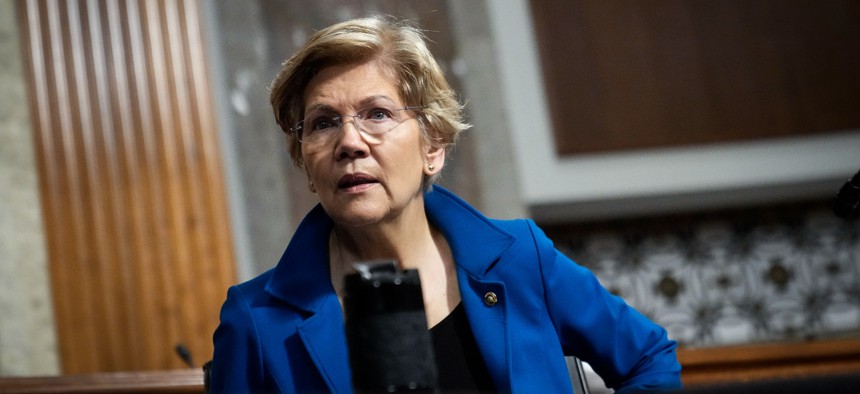Warren presses defense secretary on wasteful contractor spending

Sen. Elizabeth Warren at a Senate Armed Services Committee hearing, March 15, 2022 Drew Angerer/Getty Images
Sen. Elizabeth Warren (D-Mass.) said adding to the Pentagon's topline for 2023 to account for inflation would just invite "defense contractors to pick taxpayers' pockets."
The defense secretary fielded questions about the potential for wasteful spending and overpricing from defense contractors Thursday as Sen. Elizabeth Warren (D-Mass.) took aim at congressional Republicans' calls to increase defense topline spending to account for inflation.
"In the new budget, the Pentagon is asking for a lot of money: $773 billion. But some lawmakers say this is too low and last week they proposed adding as much as $90 billion to $100 billion more. The claim is that the extra money is needed because of inflation," Warren said during an April 7 Senate Armed Services Committee hearing on the 2023 defense budget.
"Now, there's no question that inflation is raising costs across the country, but we've also seen big companies take advantage of inflation to jack up prices and to pad their profit margins. That is a particular problem in industries with lots of consolidation."
Warren highlighted concerns that more money for DOD under the guise of inflation could lead to price-gouging, increased stock repurchases, or otherwise unjustified revenue growth for some defense contractors.
One prominent example of that, not mentioned at the hearing, was a recent investigation into DOD contracts with TransDigm, which designs, produces, and supplies spare parts for aircrafts in which the inspector general recommended a $20.8 million refund in excess profit from overpricing.
"Price gouging by defense contractors has been a big problem for a long time," Warren said.
"And CEOs are already bragging to their investors that profits will be even higher this year. That kind of profiteering wastes taxpayer dollars and it hurts military readiness."
Warren's comments come after the Pentagon produced a report that found increased consolidation among defense industry companies – with the pool shrinking by nearly 90% in 30 years. The line of inquiry also seems to take aim at a longstanding push by Republicans to increase topline spending to reflect "real growth" that keeps pace with inflation.
Ranking members for the congressional defense committees, Sen. Jim Inhofe (R-Okla.) and Rep. Mike Rogers (R-Ala.) asked the Pentagon for clarity on how inflation affects operations in a March 17 letter.
"Put simply, the inflation we are experiencing is effectively a 5 to 8 percent cut to the Department's buying power, which could amount to between $20-$30 billion in unfunded costs in fiscal year 2022 alone, not to mention lost buying power in fiscal year 2021 and potential lost buying power in fiscal year 2023," the ranking members wrote.
During the hearing, Warren challenged that assessment saying that routinely adding billions of dollars to the Defense Department's already increasing budget to cover inflation each year "invites defense contractors to pick taxpayers' pockets."
"The American people are willing to pay to defend this country but they're not going to sit still for being gouged by hugely profitable defense companies," Warren said.
Defense Secretary Lloyd Austin said he was "comfortable" with the "robust" 2023 budget request and its ability "to get the capabilities that we need to support our operational concepts," adding that he would commit to contract oversight and management that ensures the best value for taxpayer investments.
"This budget gives us what we need," Austin said.






